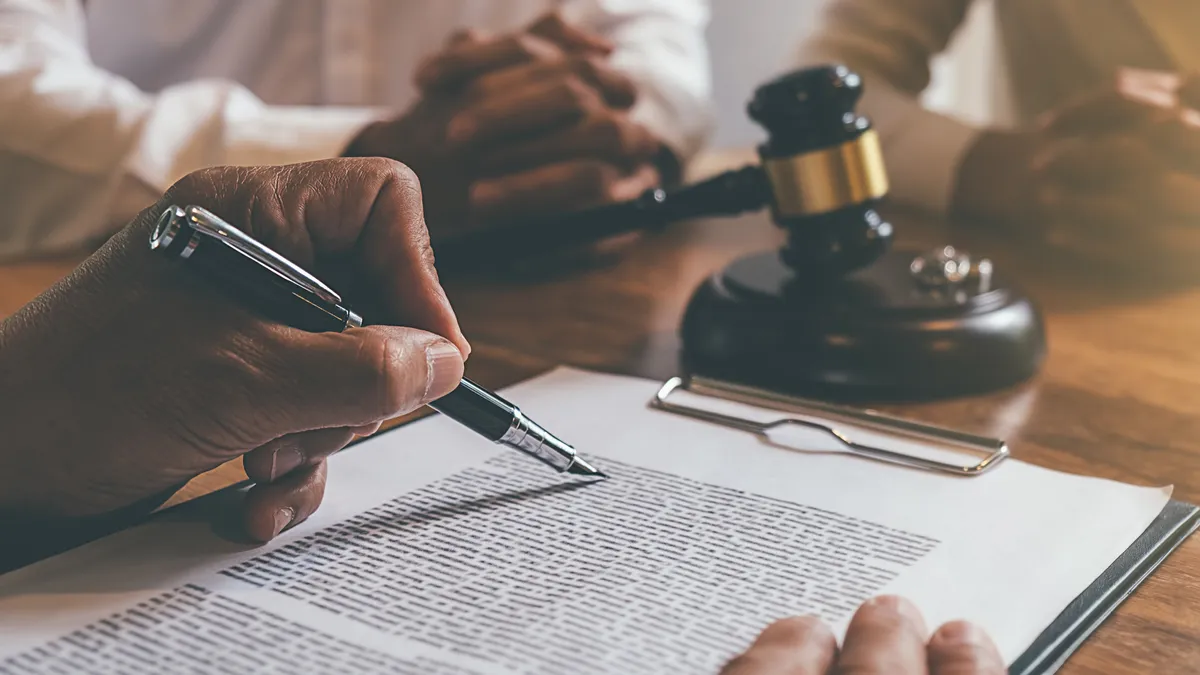UPDATE: Nov. 2, 2021: University of Florida President Kent Fuchs and Provost and Senior Vice President of Academic Affairs Joe Glover said Monday that the three professors may testify in the lawsuit against Florida's new voting law as long as they are not paid and not using university resources.
The administrators said the university was immediately starting a new task force to review its conflict of interest policy "for consistency and fidelity." The academics' participation had been deemed a conflict of interest.
Dive Brief:
- Three professors at the University of Florida are threatening to sue the institution after being barred from providing expert testimony in a lawsuit challenging the state's new law restricting voting rights.
- The faculty members' participation would be "adverse to the university's interests'' as a state institution, university officials said in a statement. They said the institution was not curtailing the professors' civil liberties or academic freedoms, as critics have accused it of doing.
- The move has also raised concerns state leaders were acting to muzzle opponents of them and the voting law. Lawyers in the case have reportedly sought to question Florida Gov. Ron DeSantis, a Republican, over whether he was involved in the decision to block the academics' involvement.
Dive Insight:
The ban on the professors testifying represents a stark departure from normal practices. It has already caught the attention of the U of Florida's accreditor, the Southern Association of Colleges and Schools Commission on Colleges, which said it would investigate, The Chronicle of Higher Education reported Monday. Universities must maintain accreditation in order for their students to receive federal financial aid.
Academics across the U.S. are routinely called upon to share expertise in their fields. The fact that a public university was stopping its faculty members from doing so raised alarm bells that their First Amendment rights were being violated.
The decision falls in line, however, with a trend of political forces interfering in matters traditionally left to individual institutions, such as the implementation of coronavirus safety measures or decisions about tenure.
These partisan battles can add pressure to faculty and their ability to perform typical duties.
Similar accusations of attempts to limit faculty speech have already emerged in Florida.
Instructors at public colleges are subject to a new law this year allowing students to record lectures for potential use in a civil or criminal court case against their institutions. Critics say this will chill faculty's free expression. That law also requires annual surveys at public colleges gauging how open students, faculty and staff feel to express their viewpoints on campus.
United Faculty of Florida, the union representing professors at U of Florida, said in a statement that if the university did not reverse this new decision, it would "establish a terrifying precedent for any Floridian who works in local or state government."
The president of the organization, which represents about 25,000 educators, said the university was trying to sway the lawsuit's outcome with a "partisan approach to public service."
Similar sentiments poured in from other corners of higher education. The Foundation for Individual Rights in Education said it was "deeply concerned" by the move. The civil liberties watchdog noted that in 2019, Plymouth State University, a public institution in New Hampshire, settled for $350,000 with an adjunct professor it fired for appearing as a court witness for a high school counselor convicted of sexual abuse.
"FIRE warned Plymouth State then, and we're warning UF now: If you pick a fight with the First Amendment, you will lose," it said.
In an emailed statement, the American Association of University Professors condemned the U of Florida's decision "in the strongest possible terms."
The AAUP noted the three U of Florida political science professors, Sharon Austin, Dan Smith and Michael McDonald, have given testimony in court cases before, making "last week's rulings by the university all the more puzzling."
The group called out politicians who wield the influence of the state to silence scholars, saying the university's rejections "reek of inappropriate political interference and are completely indefensible."
News reports have homed in on potential interference by DeSantis, who, as The New York Times reported, has allies at U of Florida. One of those is the chair of the U of Florida governing board, who supported the university fast-tracking the recent hiring of a professor, Dr. Joseph Ladapo, The Gainesville Sun reported. Ladapo was brought on within two weeks and later named DeSantis' surgeon general.










